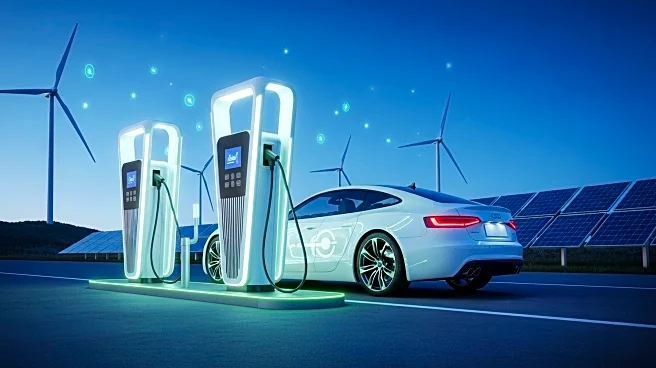What's Happening?
The U.S. Department of Energy is considering significant reductions in federal funding, potentially impacting major automakers and startups. According to an internal document, the proposed cuts could affect over $500 million in contracts awarded to more than ten startups under the Bipartisan Infrastructure Law. The review includes more than $7.5 billion in contracts previously announced. Companies such as Ford, General Motors, Stellantis, and others could face substantial financial impacts. General Motors, for instance, might lose at least $500 million in grants intended for retooling its Lansing Grand River plant in Michigan for electrified vehicle production. Other startups, like Brimstone and Anovion, are also at risk of losing significant funding for projects aimed at reducing CO2 emissions and increasing domestic graphite production.
Why It's Important?
The proposed funding cuts could have far-reaching implications for the U.S. automotive and startup industries. Automakers like General Motors and Ford are heavily investing in electrification and sustainable manufacturing, and reduced funding could slow these efforts. Startups focused on innovative technologies and materials, such as Brimstone and Anovion, may struggle to compete globally, particularly against dominant foreign manufacturers. The cuts could hinder progress in reducing carbon emissions and advancing domestic production capabilities, impacting the broader goals of the Bipartisan Infrastructure Law. Stakeholders in the automotive and construction industries may face challenges in maintaining competitiveness and achieving sustainability targets.
What's Next?
If the funding cuts proceed, affected companies may need to seek alternative financing or scale back their projects. The Department of Energy's decision could prompt reactions from industry leaders and policymakers advocating for continued support of innovation and sustainability. Companies may provide comments on the proposed cuts, potentially influencing the final decision. The situation remains fluid, with updates expected as stakeholders respond to the potential changes.
Beyond the Headlines
The funding cuts raise questions about the U.S. government's commitment to supporting green technologies and domestic manufacturing. Ethical considerations regarding environmental sustainability and economic competitiveness are at play. Long-term shifts in industry dynamics could occur if funding priorities change, affecting the U.S.'s position in global markets for electric vehicles and sustainable materials.









